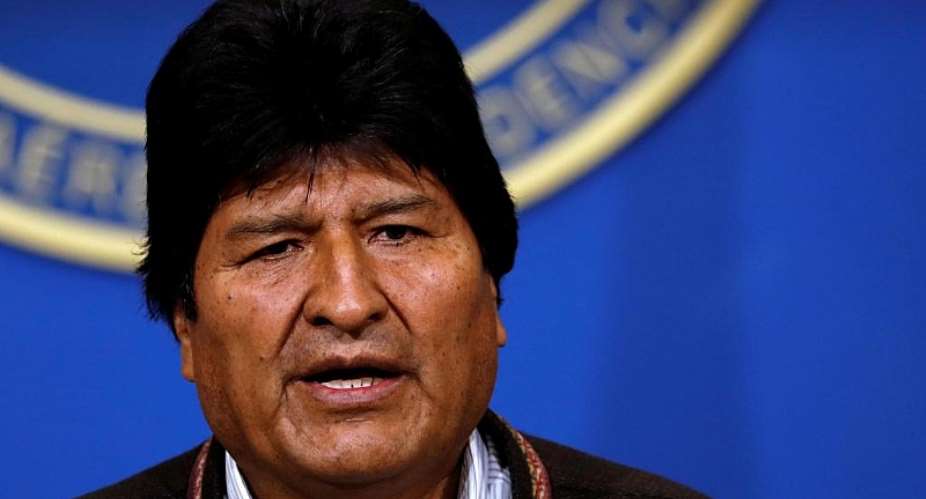Bolivian President Evo Morales has resigned, following three weeks of protests over his disputed re-election after the army and police withdrew their backing, sparking celebrations in La Paz. But other resignations created a temporary leadership vacuum in the country.
"I resign my post as president," the leftist Morales said Sunday in a televised address, in which he defended his legacy, which includes landmark gains against hunger and poverty and tripling the country's economy during his nearly 14 years in office.
A raft of ministerial resignations followed Morales' announcement including vice president Alvaro Garcia Linera.
Under the constitution, power is passed to the president of the Senate and the speaker of the lower house of Congress in that order. But they have resigned too.
An opposition senator, Jeanine Anez, said on Sunday she would assume the interim presidency of Bolivia.
Morales gained a controversial fourth term when he was declared the winner of the October 20 presidential election by a narrow margin.
The opposition said there was fraud in the vote count and three weeks of street protests ensued, during which three people died and hundreds were injured.
Voting irregularities
The Organization of American States carried out an audit of the election and on Sunday reported irregularities in just about every aspect that it examined: the technology used, the chain of custody of ballots, the integrity of the count, and statistical projections.
Although Morales said he would call new elections, this was not enough to calm the uproar.
The commanders of the armed forces and the police joined the calls for the president's resignation.
The main opposition candidate in the election, former president Carlos Mesa, said Bolivians "have taught the world a lesson. Tomorrow Bolivia will be a new country."
International Reactions
Mexico said had already received 20 members "of the Bolivian executive and legislative in its official residence in La Paz," adding that it would offer Morales asylum if he sought it.
Russia on Monday condemned opposition protests in Bolivia that led to the resignation of President Evo Morales, pointing to a "staged coup d'etat".
"We view with concern the dramatic development of events in Bolivia, where the wave of violence unleashed by the opposition did not allow Evo Morales to complete his presidential mandate," the foreign ministry said in a statement.
"We call on all political forces in Bolivia to show common sense and responsibility," the statement said, pressing for a "constitutional way out of the situation."
Cuba and Venezuela also shared this sentiment. President Miguel Diaz-Canel accused Bolivia's right of launching a "violent and cowardly coup d'etat".
Elswewhere, Federica Mogherini, European Union's foreign policy chief urged restraint and responsibility from all parties in the country, while she asked them to "lead the country peacefully and quietly to new credible elections."
The UN meanwhile said that Secretary-General Antonio Guterres is "deeply concerned" about the Bolivia developments.
Guterres "urges all concerned to refrain from violence, reduce tension and exercise maximum restraint," his spokesman said in a statement.





 Togo leader Gnassingbe follows father's political playbook
Togo leader Gnassingbe follows father's political playbook
 NDC panics over Bawumia’s visit to Pope Francis
NDC panics over Bawumia’s visit to Pope Francis
 EC blasts Mahama over “false” claims on recruitment of Returning Officers
EC blasts Mahama over “false” claims on recruitment of Returning Officers
 Lands Minister gives ultimatum to Future Global Resources to revamp Prestea/Bogo...
Lands Minister gives ultimatum to Future Global Resources to revamp Prestea/Bogo...
 Wa Naa appeals to Akufo-Addo to audit state lands in Wa
Wa Naa appeals to Akufo-Addo to audit state lands in Wa
 Prof Opoku-Agyemang misunderstood Bawumia’s ‘driver mate’ analogy – Miracles Abo...
Prof Opoku-Agyemang misunderstood Bawumia’s ‘driver mate’ analogy – Miracles Abo...
 EU confident Ghana will not sign Anti-LGBTQI Bill
EU confident Ghana will not sign Anti-LGBTQI Bill
 Suspend implementation of Planting for Food and Jobs for 2024 - Stakeholders
Suspend implementation of Planting for Food and Jobs for 2024 - Stakeholders
 Tema West Municipal Assembly gets Ghana's First Female Aircraft Marshaller as ne...
Tema West Municipal Assembly gets Ghana's First Female Aircraft Marshaller as ne...
 Dumsor is affecting us double, release timetable – Disability Federation to ECG
Dumsor is affecting us double, release timetable – Disability Federation to ECG
